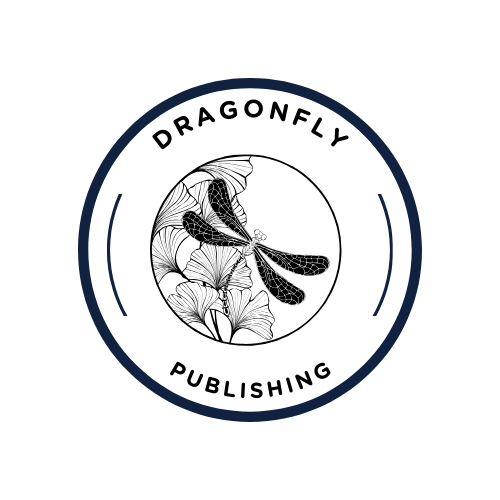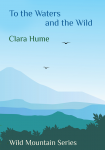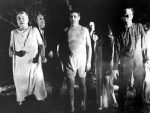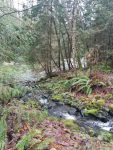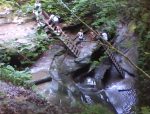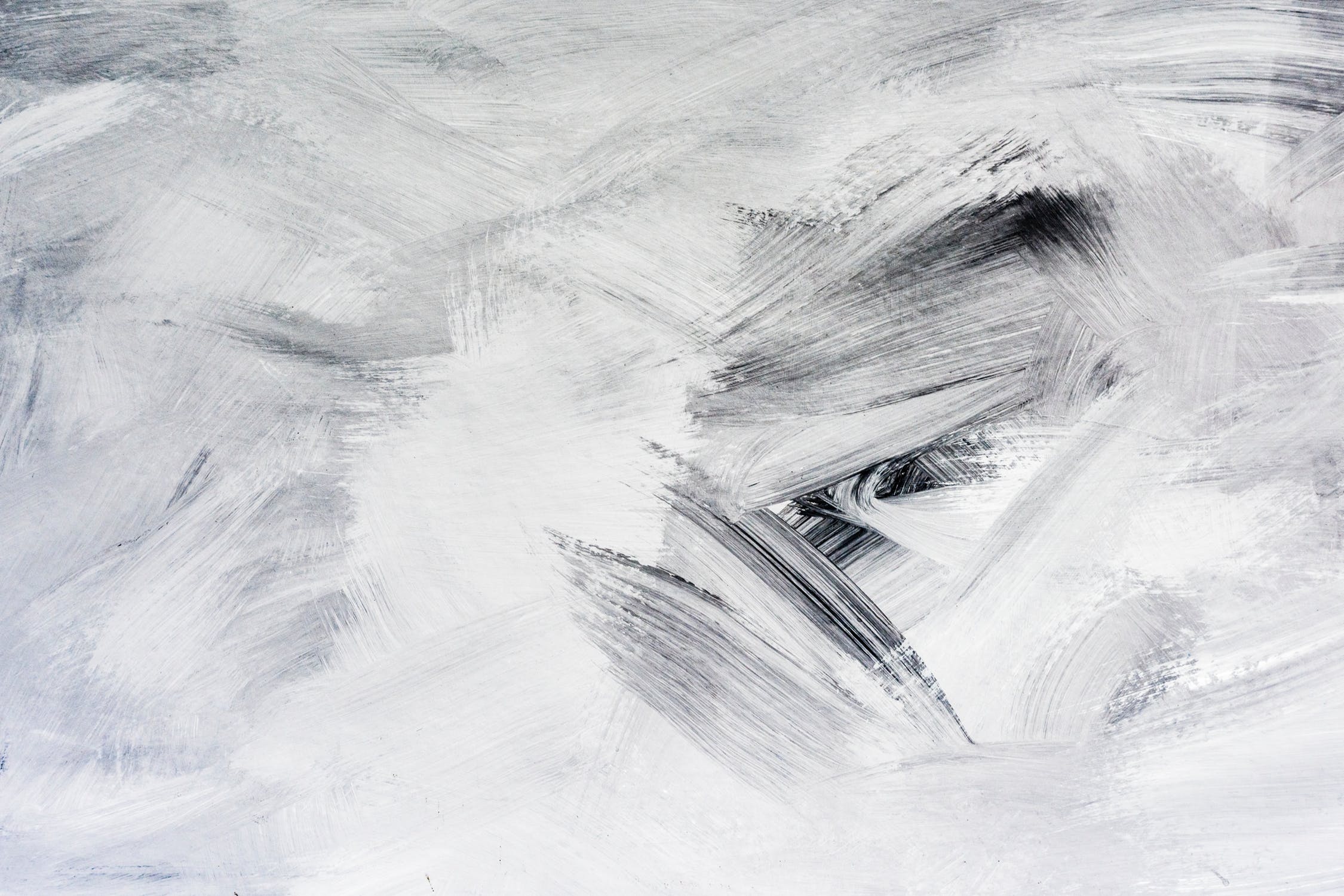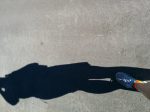In the midst of a golden-lit and cooling autumn, where trail hikes and short runs coincide with dreamy days, I am going to do an indoor exercise here, and share it with other writers in hopes they take part as well. This is a long exercise, will take some time and thought to answer the questions, and I hope to gather some information about writers who tackle climate change in fiction, which may cover various environmental issues and socio-economic-political problems that either contribute to, or result from, environmental collapse.
I do a lot of interviews on the main site, and have been interviewed a few times myself, but hardly ever really talk about my writing in-depth. The following author interview “template” questions are from The Wordsmiths’ Forge, and I thought it might be a fun thing to answer as I have been exploring my own writing and how I might improve or branch out with it. Note that I have never used a template when asking other authors questions; I tailor questions to them. However, the women in my family used to do these fun surveys, which were more life-related than writing-related–and they served as an exercise in keeping up with each other, since we are spread out across two countries and don’t get to see each other too often. I enjoyed our surveys, or questions, or explorations–however you might want to think of them.
How did you become involved with the subject or theme of your book?
In the mid-2010s I was wondering why global warming wasn’t explored too well in contemporary novels. I began writing what was then a stand-alone novel, Back to the Garden, under pen name Clara Hume. Only later, when the novel was published and I dug deeper into other novels that also explored global warming, did I find that there were more novels than I had previously thought and that there were also a diversity of approaches to writing about what is known as “climate catastrophe.” That it’s not really a new idea (in terms of writing fiction about human-caused climate change), as pioneers in-the-know, such as Ursula K. Le Guin and Arthur Herzog, were tackling the subject as early as the late 1970s, when scientists converged on the fact that global warming would become the next big risk to the planet. And the topic in fiction has been growing. However, climate change is not a stand-alone event. It’s very much mixed in with so many other issues that the term “hyperobject” is thrown about often when talking about it in writing.
Cautionary fiction is now reflective fiction. Science fiction is now a love story (as my friend Michael Rothenberg wrote in the foreword to Winds of Change, an anthology of short stories). I realized I could not change the world with a novel. I could only light one candle along the way, like other authors. Climate catastrophe is not something we can quickly fix, or really fix at all–all we can do is adapt to it and mitigate it.
I’m now revising that debut novel to be the start of the Wild Mountain series, which is a look at people in the future after global warming has made a marked difference in the world as we know it. It’s about starting over. It’s about love. It’s about the same dark side we’ve always known as humans: standing up to those who have calculated intent to harm others so that they can elevate their power, fame, money, etc., or because they feel bigger than, or in some cases illogically threatened by, the other (because of differences of belief, skin color, faith, sexual orientation, gender, even opinion).
Why did you choose to write in your particular field or genre? If you write more than one, how do you balance them?
I try not to “pick a genre and write in it” due so much genre-blurring that I see today. I understand genres are helpful for categorizations, but the downside can be genre tribalism and territorialism, which is absolutely antithetical to the reason anyone would write about or care so much about others and our planet. I’m more interested in trying to write a good story, and using words and ideas to talk about a novel rather than single phrases, which have the disadvantage of being exclusionary. But I do often write in the context of wilderness and the great outdoors and our place in that. If there’s any genre that covers that in a general way, it is probably eco-fiction or nature writing. I have called my series “speculative fiction” as well since it deals with the future. I’m also interested in weird fiction, in the ecological sense, but have only dabbled in it.
Where did your love of books/storytelling/reading/writing/etc. come from?
I’ve always been an introverted, observant person, with a hankering for adventuring, experimenting, and freeing myself from cultural trappings. I read a lot as a kid, starting from a very young age, actually, so I think what I read influenced who I would become. I have a great memory, so recall early “reading,” also known as figuring out context from illustrations. The first book I remember reading, or looking at, was The Complete Grimm’s Fairy Tales, a book my parents had collected. Fairy tales, and many old stories, were completely mesmerizing, as were some of those old illustrations (some scary), and nature was a strong character in these parables and tales. I went on to devour so many stories that I still completely cherish. My daughter recently gave me the Little House on the Prairie set of books, for instance, and I have it displayed on a bookshelf and have enjoyed re-reading it. I also love old libraries–the smell of books and wooden shelves, the quiet sanctuary of reading in a library with sunlight slanting in from a nearby window.
How long have you been writing?
I began writing also when very young. I was the quiet girl who had her nose in a book or her pen in a notebook. At least I was doing that when I wasn’t being a monkey outside: climbing trees, running all over the place, etc.
What kind(s) of writing do you do?
I have answered that in detail above. I guess the only thing I would add is that I’ve been busy maintaining dragonfly.eco, so have conducted many interviews there and blog posts here at this site. I’ve also written some articles and guest-posts at other sites, such as SFF World and Free Word Centre. And I’m working on a yet-to-be-announced book about wild rivers, in which I’ll be writing about the wild Atnarko River in British Columbia–a place I spent some time at a couple years ago.
What cultural value do you see in writing/reading/storytelling/etc.?
The cultural value of storytelling is absolutely paramount to society. From early on, when storytelling was in the oral tradition (even though that still exists, written stories have become commonplace), stories were passed on by generations and helped to create ideologies and cosmologies. Nature played a huge part in these stories, of course. I find old stories (mythology, legends, classic stories that helped to get us where we are now) more interesting than some of the quick and distracting stories of modern times that are all about political narratives. Still, books and authors and wonderful stories are still alive, and they fulfill a lot of cultural needs because they are inspirational, educational, informative, uncanny, cautionary, humorous, romantic–what have you. Our lives are greatly enhanced by the stories we read and write.
How does your book relate to your spiritual practice or other life path?
The books I’m writing reflect my interest in getting back to nature, in trying to eschew modern convenience and status quo that has led to the destruction of natural resources and environmental and climate catastrophes. I am curious about what happens when this world as we know it ends, when there is a rewilding. Are the survivors going to make the same mistakes? What have we learned? What would it really be like to have the world’s largest riches at your fingertips–not fame, not cars, not huge houses, not lots of money, but clean water, clean air, healthy relationships with friends and families around you, a more egalitarian way of living. It is not an easy life. It is a survivalist life. It’s not romanticized or sensationalized. But it’s rewarding.
What were your goals and intentions in this book, and how well do you feel you achieved them?
With my first attempt at the novel, it was a cautionary tale–yet also I liked the story, as it put humanity (character redemption, relationships, and soul-searching) into the center of the story. The chapters were told by alternating characters, and I got mixed feedback. Some liked it, some were confused. I won’t change that part, but will try to strengthen these characters, and some conflicts between them. I’m also removing some more didactic parts. There seemed to be quite a bit of interest in the novel when it was published, and it made its way into some classrooms and academic papers and books.
Can you share some stories about people you met while researching this book?
I met a number of people after publishing the novel–other nature writers particularly. Some have become friends and close colleagues, and we’ve worked on other projects together, such as opening a Facebook page and a Google+ group that explore ecology in literature and the arts. I’m writing for the wild rivers book mentioned above and have participated in events such as a “20 Wild Authors” book give-away. I’ve sat in on some panels with folks, both online and in person, discussing everything from solarpunk to eco-fiction to climate change and storytelling. I collaborated with other authors last year at an eco-fiction stage in Vancouver’s Word, the largest literary event in western Canada. There, I reunited with authors I’d worked with before, such as Claudia Casper and Katie Welch. And on Earth Day this year I sat again with Claudia on a panel at the West Vancouver Memorial Library; we talked with Deborah Hartford, executive director of ACT, a Simon Fraser University initiative.
I’ve had the opportunity to interview people like David Brin, Lorna Crozier, Jeff VanderMeer, Omar el Akkad, Cory Doctorow, and Emmi Itäranta, and these folks were friendly and easy to talk with. I have to say that Jeff VanderMeer is my newest favorite author–as of the past few years anyway–and he is a very caring person. It’s always nice to talk to people whose work you enjoy, but when they are down-to-earth and approachable, it’s a real honor. Overall, I have had positive experiences getting to know people who write in this field, and I feel that I’m in with a good mix of people. On the other hand, I am still that silent, observant person I have always been, since a kid, and so while I like to reach out to others, when I write it is very personal, freeing, and explorative on my own.
What are some of the references that you used while researching this book?
I read scientific articles and climate modeling research. My Uncle Don, a retired geologist, read the first draft of the book for technical advice. My go-to’s were and are NASA, NOAA, and any news media that I trust to be as factual as possible–New York Times, even The New Yorker for more in-depth journalism. There is always speculation when it comes to world-building a future based upon the path we seem to be headed, but I don’t think fiction should have the responsibility to predict, only the freedom to ask “what if.”
Also, even though my current series isn’t weird fiction, I am interested in doing a short story using some of the tools of that genre, inasmuch as I think it’s a great way to explore ecological disaster. I wrote some about that in the SFF World link above.
What do you think most characterizes your writing?
I like to write a lot about mythology, nature, and the types of experiences I had growing up, which are probably out of the mainstream. I mean, my mother came from the hills of eastern Kentucky, so half our relatives growing up lived off the land and were smack dab in the mountains. Visiting them was like going back in time and to a different place. During Christmas, we would go into the mountains to cut down a tree, and there wasn’t a big consumerist mindset with plastic snowmen or ornaments. We would put Mammaw’s decades-old wooden art or ornaments on the tree. We just had a very loving family, and we’re still close, and these are the kinds of experiences I like to write about, where rich experiences were not bought but felt.
What was the hardest part of writing this book?
Writing about the largest crisis we face, global warming, in a future world, with ten characters’ voices–this project seemed wide for a debut novel. The second part of the series is much more focused.
What did you enjoy most about writing this book?
I enjoyed building a world and characters that people liked. One of my nieces said she was forever changed by the novel and just loved the main character Fran. I got a lot of personal feedback like this. Another thing I liked was naming characters. You’ll see practically my whole family in there (name only), and if they didn’t make it into the first book, they are in the second one. I also inserted one Easter egg. Who is the red-headed woman Caine saw, who looked like a ghost walking down the empty street of the small Colorado town? Nobody has guessed yet.
Are there vocabulary words or concepts in your book that may be new to readers? Define some of those.
I don’t think so. The novel was rather simplistic, really. Poet Tom Hibbard had an interesting viewpoint in his review of my novel at Galatea Resurrects:
The minimalism of the writing style makes the humans seem like pastoral people, experiencing life on very fundamental levels and in very fundamental feelings—happiness, sadness, horror, wonderment, fear, hunger, interdependence, helpfulness toward each other as a means of protective strength. One of the defining facets of eco-fiction is that the human perspective is only a small, subservient part of the wider, global perspective. The characters are portrayed factually but incompletely, as part of the ecological picture. This is a different sort of realism, a lighter, lessego-based realism than the probing, heavy, psychological torment of so-called modern realism
…As pretense crumbles in its own instability, the real pleasures and rewards of life are brought forward. They are brought forward in their essential spontaneity and singularity. The patchwork presentation of a world that has radically fallen to pieces, as happens many times, in the Great Depression for instance, uncovers life of our species and planet on a level that reveals the paradise in which we have been dwelling all along.
Are there underrepresented groups or ideas featured if your book? If so, discuss them.
This is not a white Western narrative, even though the first book is set in the United States. People of all skin colors and backgrounds make up the main characters. Women are natural leaders. In the second book, which I’m writing now, there is also an LGBTQ component, but that’s an analytical description. Everyone in the “new world” has trouble finding someone to love because it’s simply hard to find someone at all around your age.
Are there misconceptions that people have about your book? If so, explain.
A 2-star review called it, in a derogatory sense, “science fiction,” as in “climate change is not real.” I think this kind of misconception is more about misinformation. Also, science fiction engages on the path of real science and is a wonderful genre.
What is the biggest thing that people THINK they know about your subject/genre, that isn’t so?
Well, climate denialism is still big in the United States, but global warming is a fact almost everywhere else.
What is the most important thing that people DON’T know about your subject/genre, that they need to know?
If people do not know, I guess they should start learning more about science, something that sadly has been defunded and ridiculed, especially in some places in the United States.
What inspires you?
Lots of things inspire me, mostly simple things. When I see the way golden light during the autumn falls across the forest, I get inspired. I am most “at home” out of the trail, running or hiking. Anything in nature, really, makes me feel downright good. People inspire me too–mostly certain people among my family and friends who are doing great things in their lives.
How did you get to be where you are in your life today?
Practice. Failing and getting back up. Admitting mistakes. Learning. Avoiding regret. Working hard. Following my dreams and interests. Committing myself to the work I love, despite obstacles and challenges. Allowing myself to be silly, play a lot, and not take everything so seriously. I was extremely fortunate to have the greatest parents in the world. My dad died eight years ago, and he was my role model–my mother, still living, is one of my best friends. They raised us kids to be humble, open-minded, loving, and, along with all these qualities, also to be hard-working, committed, able to shake off the hard things, and, above all, to not sweat the little shit.
Who are some of your favorite authors that you feel were influential in your work? What impact have they had on your writing?
I’ve always had a wide range of likes. Growing up, it was Laura Ingalls Wilder, Scott O’Dell, JRR Tolkien, and so many others–too many to list here. In my teenage and young adulthood, I went through phases of reading everything from Jack Kerouac to Fyodor Dostoyevsky. I really enjoy mystery stories like Hilton’s The Lost Horizon and William Golding’s Lord of the Flies. Anything by Lovecraft or some of the other horror/weird authors: Michael Bernanos, Arkady and Boris Strugatsky, Algernon Blackwood. A sense of place, which is key to world-building, especially when the place is wild, even eerie, makes up some of my favorite fiction. I am doing a spotlight over at the main site that focuses on authors who explore climate change in fiction. After realizing I was in no way unique (insert grin here) in this journey of including global warming as a big character within fiction, I began looking at other novelists who do the same and found so many diverse ways and genres this fiction attracts. You’ll find a lot of my current favorite authors at the main site, and in the interviews I do. I’ve recently been reading, other than Jeff VanderMeer, more works by James Bradley, Ali Smith, and others. I’m looking forward to some novels too, particularly John Atcheson’s and Barbara Kingsolver’s upcoming novels. Reading always helps writers because it looks outside what we think we know.
What did you find most useful in learning to write? What was least useful or most destructive?
I think I’m always learning. Going back to the previous question, reading is the best teacher. The least useful is trying, however, to mimic other writers. You really have to find your own niche, your own voice. It’s very hard to know if your voice works.
Are you a full-time or part-time writer? How does that affect your writing?
Part-time. I always think to myself: No regrets, Coyote. But if there was one thing I’d change about my life, it would be doing away with my “day-job” (which is awesome and nothing to complain about) and writing full-time. I believe someday I’ll be there, just not today.
What are some day jobs that you have held? If any of them impacted your writing, share an example.
I have worked as an editor or writer since college. My first job, right out of college, was great because it was basically a bunch of English nerds who couldn’t find a job at fiction publishing houses–but did find a job in the new and growing industry of computer books. But, underneath it all, we were still literary nerds and were more into Chaucer or Shakespeare than Teach Yourself Java Programming in 21 Days. It was at this job that I made life-long friendships and learned more about editing and grammar stuff than in all the years of prior education. I am still a strict person (in my own work) about using serial commas and using restrictive and non-restrictive clauses correctly.
For those interested in exploring the subject or theme of your book, where should they start?
My website (dragonfly.eco) is a great starting part for exploring eco-fiction and climate change in fiction on the web. It may lead you down several rabbit holes. It’s a reference site but also digs deeper with author interviews, spotlights, and so on. My twitter also is a place to find (almost daily) news links to quality journalism covering similar works.
How do you feel about ebooks vs. print books and alternative vs. conventional publishing?
I have written quite a bit about this subject in the past (PDF doc with outdated links, which I should update at some point), as I also run a tiny press. I feel very strongly about having a good environmental ethic for the business. I feel that conventional publishing is wasteful unless you have someone who is very good at estimating sales. I wish that publishing was not a business but an art form. In an amazing speech at the 2014 National Book Awards, Ursula K. Le Guin said:
Hard times are coming, when we’ll be wanting the voices of writers who can see alternatives to how we live now, can see through our fear-stricken society and its obsessive technologies to other ways of being, and even imagine real grounds for hope. We’ll need writers who can remember freedom–poets, visionaries–realists of a larger reality. Right now, we need writers who know the difference between production of a market commodity and the practice of an art. Developing written material to suit sales strategies in order to maximise corporate profit and advertising revenue is not the same thing as responsible book publishing or authorship. Yet I see sales departments given control over editorial. I see my own publishers, in a silly panic of ignorance and greed, charging public libraries for an e-book six or seven times more than they charge customers.
I personally prefer holding a real book in my hand, and I am fond of libraries, so have two in my house–one in the living room and another in a guest room.
What do you think is the future of reading/writing?
It will continue, in some form. What form that is, I don’t know, nor can I guess. For a while ebooks were selling more than paper books, but that trend has reversed.
As far as the kind of fiction I’m writing, I stated at the main site:
The purpose of the author spotlight series is to highlight major authors who write fiction that deals with global warming. Many scholars argue that climate change is now everything change. That writing about it is often not a separate subject or genre because it is so interconnected to all life on the planet. Author Margaret Atwood noted that climate change is “everything change” too. This site recognizes this concept in totality, that we are now living in the Anthropocene where climate change is entirely ubiquitous in every aspect of life for everyone on Earth. For the purposes of literary study, and because many authors have blazed the trail in bringing climate change into literature, this series exists. These spotlights explore the diversity of storytelling that involves climate change. Yet, I believe that in the future, global warming will be a part of every story; in that sense, this site is an evolutionary and transitory one from this era to whatever lies beyond.
What process did you go through to get your book published?
For me, it was easy. I published it at my press because I was looking for novels that had something about global warming in them. Of course, the rest of my books are from other authors.
What makes your book stand out from the crowd?
I think when people look forward to reading post-apocalyptic or speculative fiction, they expect the story to be fast-paced, thrilling, and all that stuff. Mine is not that. It’s as close to a literary novel I can think of–with as much contemporary knowledge and realism to make it blur genres between literary and speculative. In that sense, a lot does happen in the novel, but it is more slow-paced and thoughtful than one might expect. It’s about life; it’s not a blockbuster hit.
How do you find or make time to write?
I write during my lunch break, unless I’m out running or hiking, and at nights or on the weekends. My life is so full of stuff-to-do that I write slowly. However, I am 1/8th of the way through the second novel in the Wild Mountain series and close to finished on revising the first. My goals are to publish the revision of the first novel in the summer of 2018, and the second novel in 2019. I’m already realizing what will happen in the third novel of the series. I’d also like to do some short stories in the next few years.
I used to write late at night, maybe while sipping red wine–but now I get up too early and don’t stay up that late anymore. Is that a sign of getting older?
Do you write more by logic or intuition, or some combination of the two? Summarize your writing process.
I think it’s more writing by experience. The writing process, for me, often begins in my head while I’m on the trail. I’m out there, sweating, listening to music, watching for bears, seeing nature’s amazing uncanny and raw charm, and I start realizing what is going to happen in my novel. Visiting Ireland last year also motivated me to turn my first novel into a series. The people in the novel don’t go to Ireland, but some mythology and memory of the place is very strong in the second novel–and its title, To the Waters and the Wild, is a nod to Yeats, of course, and to his poem “The Stolen Child,” which is really about coming to the wild where it’s free, and getting away from our trappings that society confines us in–it’s also physically about faerie mythology, which I think is interesting. As I’m writing, I’ll often insert hyperlinks within the text of where to get more ideas and information about what I’m writing. So in this case, I think there’s some logic–or research-based study on things I’m writing about. But intuition comes into play when characters interact.
What are some ways in which you promote your work? Do you find that these add to or detract from your writing time?
It was hard at first. I was a debut novelist, publishing through a tiny press. Nobody knew me then. And, even though in this field of literature, my work is starting to get notice, as a novelist, I know I am not still really known about and that’s okay. I’m only just now starting to be active with author pages on Twitter and Facebook. These fledgling social media outlets are very hard for me to keep up with. My life is too full to extend to too many places, especially online, and what I have to say is often done long-hand, not within a limited number of characters. So, in that sense, promotion detracts from my actual writing work. I already spend so much time with the main site and its outreach sites to be able to maintain anything else. But other authors have encouraged me to try!
What is your role in the writing community?
I am not really sure. I have been asked to sit in on panels here and there and get lots of emails with questions, and I work with a lot of publishers–but I think that’s more due to my running of the main site than anything else. I think people see me as a reference librarian or literary promoter. Once someone called me an “eco-fiction expert,” and I blushed when I read it because I feel like a literary explorer rather than an authority, and the posts I’ve written are full of cited research, not my own opinions. I have gotten to know authors and readers, but when they find out I have also written a novel, they’re like, “Really? What is it?” Maybe it’s that I used a pen name or haven’t been promoting it much due to the upcoming re-do of it, but it makes me laugh when this happens.
What do you like to read in your free time?
I have been reading Jeff and Ann VanderMeer’s The Weird: A Compendium of Strange and Dark Stories as I’m writing a short series of the ecological weird for SFF World. The compendium is a huge book! I can barely hold it in my hands. I have to read at night, with the big book on my lap. I’ve already read quite a few stories in this collection, but I kind of like the horror genre–not really the blood and guts novels but the uncanny/odd/preternatural/whoa stories.
What projects are you working on at the present?
- Editing and finalizing a book by Marissa Slaven called Code Blue
- Working on the second part in the SFF World ecological weird series
- Revising Back to the Garden and writing To the Waters and the Wild, for my “Wild Mountain” series
What do your plans for future projects include?
- Drafting a piece on the Atnarko River (more on that later)
- Writing an article on the ecology of the Game of Thrones series
- Finishing a novel called Up the River, about an oil spill in the Appalachian Mountains
- Continued author spotlights and interviews at dragonfly.eco
- Figuring out the third (maybe final) novel in the Wild Mountain series
